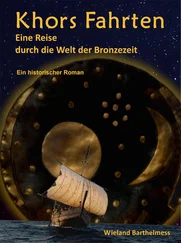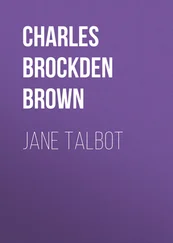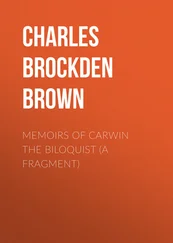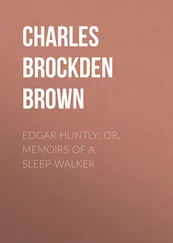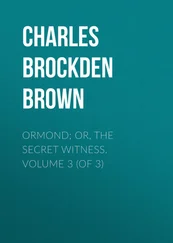In a few minutes he returned. I was somewhat interested in the dispute, and was therefore impatient for his return; yet, as I heard him ascending the stairs, I could not but remark, that he had executed his intention with remarkable dispatch. My eyes were fixed upon him on his entrance. Methought he brought with him looks considerably different from those with which he departed. Wonder, and a slight portion of anxiety were mingled in them. His eyes seemed to be in search of some object. They passed quickly from one person to another, till they rested on his wife. She was seated in a careless attitude on the sofa, in the same spot as before. She had the same muslin in her hand, by which her attention was chiefly engrossed.
The moment he saw her, his perplexity visibly increased. He quietly seated himself, and fixing his eyes on the floor, appeared to be absorbed in meditation. These singularities suspended the inquiry which I was preparing to make respecting the letter. In a short time, the company relinquished the subject which engaged them, and directed their attention to Wieland. They thought that he only waited for a pause in the discourse, to produce the letter. The pause was uninterrupted by him. At length Pleyel said, "Well, I suppose you have found the letter."
"No," said he, without any abatement of his gravity, and looking stedfastly at his wife, "I did not mount the hill."—"Why not?"—"Catharine, have you not moved from that spot since I left the room?"—She was affected with the solemnity of his manner, and laying down her work, answered in a tone of surprise, "No; Why do you ask that question?"—His eyes were again fixed upon the floor, and he did not immediately answer. At length, he said, looking round upon us, "Is it true that Catharine did not follow me to the hill? That she did not just now enter the room?"—We assured him, with one voice, that she had not been absent for a moment, and inquired into the motive of his questions.
"Your assurances," said he, "are solemn and unanimous; and yet I must deny credit to your assertions, or disbelieve the testimony of my senses, which informed me, when I was half way up the hill, that Catharine was at the bottom."
We were confounded at this declaration. Pleyel rallied him with great levity on his behaviour. He listened to his friend with calmness, but without any relaxation of features.
"One thing," said he with emphasis, "is true; either I heard my wife's voice at the bottom of the hill, or I do not hear your voice at present."
"Truly," returned Pleyel, "it is a sad dilemma to which you have reduced yourself. Certain it is, if our eyes can give us certainty that your wife has been sitting in that spot during every moment of your absence. You have heard her voice, you say, upon the hill. In general, her voice, like her temper, is all softness. To be heard across the room, she is obliged to exert herself. While you were gone, if I mistake not, she did not utter a word. Clara and I had all the talk to ourselves. Still it may be that she held a whispering conference with you on the hill; but tell us the particulars."
"The conference," said he, "was short; and far from being carried on in a whisper. You know with what intention I left the house. Half way to the rock, the moon was for a moment hidden from us by a cloud. I never knew the air to be more bland and more calm. In this interval I glanced at the temple, and thought I saw a glimmering between the columns. It was so faint, that it would not perhaps have been visible, if the moon had not been shrowded. I looked again, but saw nothing. I never visit this building alone, or at night, without being reminded of the fate of my father. There was nothing wonderful in this appearance; yet it suggested something more than mere solitude and darkness in the same place would have done.
"I kept on my way. The images that haunted me were solemn; and I entertained an imperfect curiosity, but no fear, as to the nature of this object. I had ascended the hill little more than half way, when a voice called me from behind. The accents were clear, distinct, powerful, and were uttered, as I fully believed, by my wife. Her voice is not commonly so loud. She has seldom occasion to exert it, but, nevertheless, I have sometimes heard her call with force and eagerness. If my ear was not deceived, it was her voice which I heard.
"Stop, go no further. There is danger in your path." The suddenness and unexpectedness of this warning, the tone of alarm with which it was given, and, above all, the persuasion that it was my wife who spoke, were enough to disconcert and make me pause. I turned and listened to assure myself that I was not mistaken. The deepest silence succeeded. At length, I spoke in my turn. Who calls? is it you, Catharine? I stopped and presently received an answer. "Yes, it is I; go not up; return instantly; you are wanted at the house." Still the voice was Catharine's, and still it proceeded from the foot of the stairs.
"What could I do? The warning was mysterious. To be uttered by Catharine at a place, and on an occasion like these, enhanced the mystery. I could do nothing but obey. Accordingly, I trod back my steps, expecting that she waited for me at the bottom of the hill. When I reached the bottom, no one was visible. The moon-light was once more universal and brilliant, and yet, as far as I could see no human or moving figure was discernible. If she had returned to the house, she must have used wondrous expedition to have passed already beyond the reach of my eye. I exerted my voice, but in vain. To my repeated exclamations, no answer was returned.
"Ruminating on these incidents, I returned hither. There was no room to doubt that I had heard my wife's voice; attending incidents were not easily explained; but you now assure me that nothing extraordinary has happened to urge my return, and that my wife has not moved from her seat."
Such was my brother's narrative. It was heard by us with different emotions. Pleyel did not scruple to regard the whole as a deception of the senses. Perhaps a voice had been heard; but Wieland's imagination had misled him in supposing a resemblance to that of his wife, and giving such a signification to the sounds. According to his custom he spoke what he thought. Sometimes, he made it the theme of grave discussion, but more frequently treated it with ridicule. He did not believe that sober reasoning would convince his friend, and gaiety, he thought, was useful to take away the solemnities which, in a mind like Wieland's, an accident of this kind was calculated to produce.
Pleyel proposed to go in search of the letter. He went and speedily returned, bearing it in his hand. He had found it open on the pedestal; and neither voice nor visage had risen to impede his design.
Catharine was endowed with an uncommon portion of good sense; but her mind was accessible, on this quarter, to wonder and panic. That her voice should be thus inexplicably and unwarrantably assumed, was a source of no small disquietude. She admitted the plausibility of the arguments by which Pleyel endeavoured to prove, that this was no more than an auricular deception; but this conviction was sure to be shaken, when she turned her eyes upon her husband, and perceived that Pleyel's logic was far from having produced the same effect upon him.
As to myself, my attention was engaged by this occurrence. I could not fail to perceive a shadowy resemblance between it and my father's death. On the latter event, I had frequently reflected; my reflections never conducted me to certainty, but the doubts that existed were not of a tormenting kind. I could not deny that the event was miraculous, and yet I was invincibly averse to that method of solution. My wonder was excited by the inscrutableness of the cause, but my wonder was unmixed with sorrow or fear. It begat in me a thrilling, and not unpleasing solemnity. Similar to these were the sensations produced by the recent adventure.
Читать дальше

